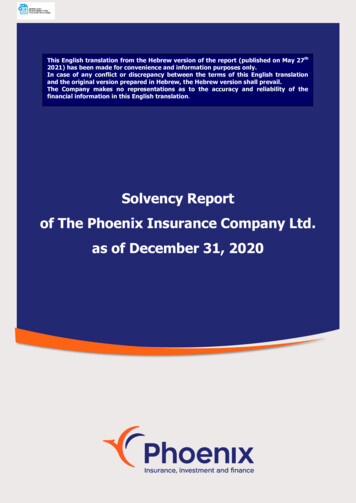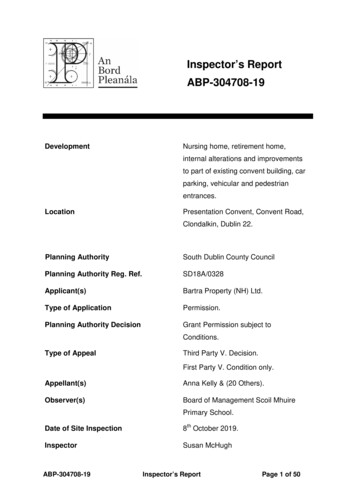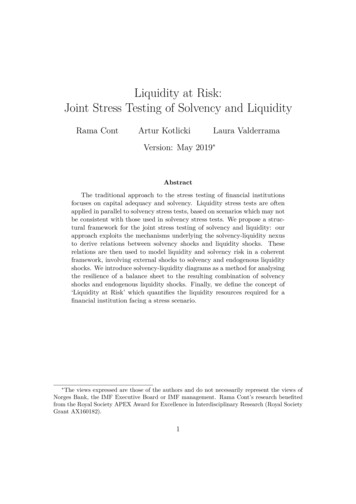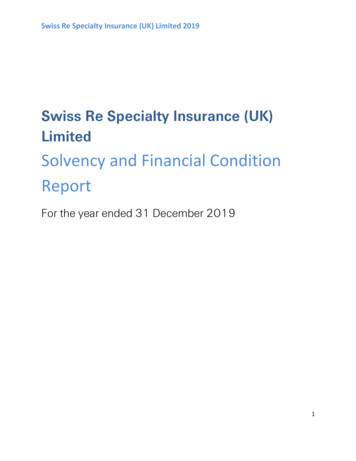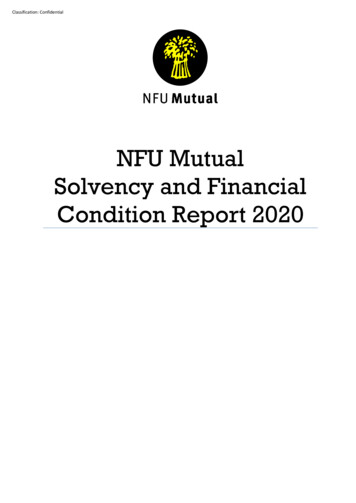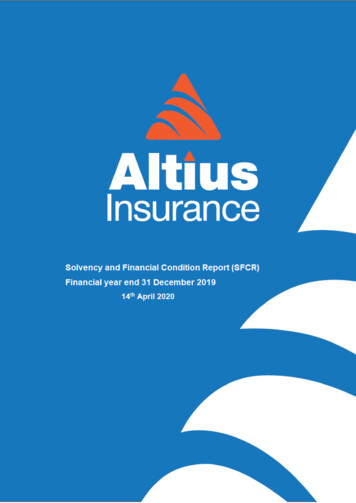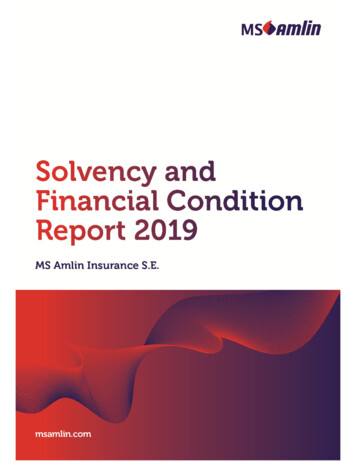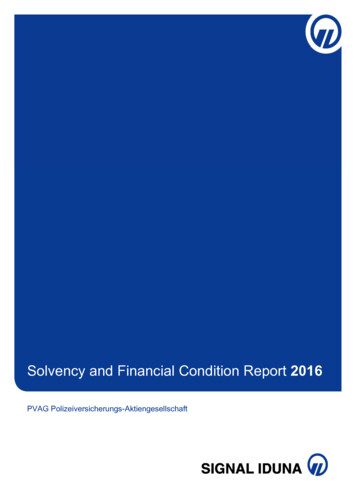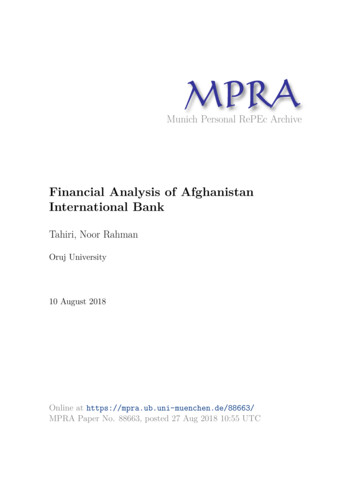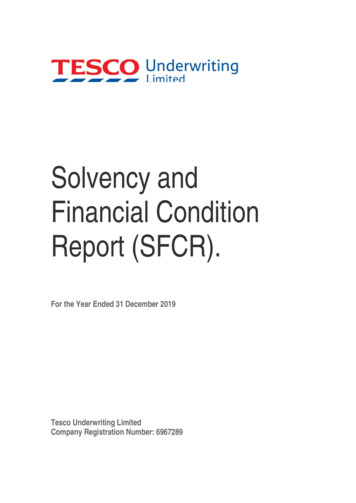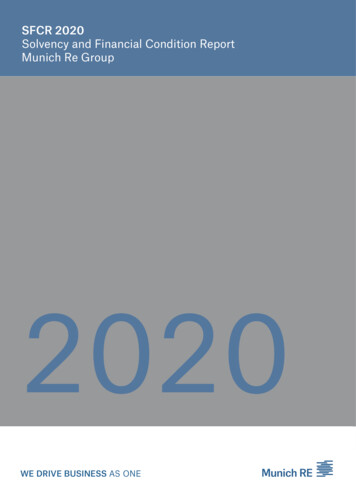
Transcription
SFCR 2020Solvency and Financial Condition ReportMunich Re Group2020
1ContentsExecutive summary2AA1Business and performanceBusiness55A2Underwriting performanceA3Investment performance12A4Performance of other activities14A5Other information14BB1System of governanceGeneral information on the system of governance1616B2Fit and proper requirements23B3Risk management system including the own risk and solvencyassessment (ORSA)26B4Internal control systemB5Internal audit function31B6Actuarial function32B7Outsourcing33B8Any other information34CC1Risk profileUnderwriting risk3638C2Market risk41C3Credit risk44C4Liquidity risk45C5Operational risk46C6Other material risks46C7Other risks47DD1Valuation for solvency purposesAssets5151D2Technical provisions62D3Other liabilities70D4Alternative methods for valuation74D5Any other information74EE1Capital managementOwn funds7676E2Solvency capital requirement and minimum capitalrequirement83E3Use of the duration-based equity risk sub-module in thecalculation of the solvency capital requirement84E4Differences between the standard formula and any internalmodel used85E5Non-compliance with the minimum capital requirement andnon-compliance with the solvency capital requirement88E6Any other information82988Annex89Templates in accordance with Commission ImplementingRegulation (EU) 2017/2190 of 24 November 201790This document is a translation of the original German version and isintended to be used for informational purposes only. While everyeffort has been made to ensure the accuracy and completeness of thetranslation, please note that the German original is binding.
2Executive summaryExecutive summaryPartPageA – Business andperformanceThe business activities in our reinsurance and ERGO fields of business are broken downinto material lines of business and regions. The technical result for the Group as a wholewas below the level of the previous year. In property-casualty reinsurance, high COVID19-related loss expenditure led to a significant decline in the result. In life and healthreinsurance, the technical result was also impacted by the pandemic. In the ERGO field ofbusiness, by contrast, the technical result was up, mainly thanks to the ERGO Life andHealth Germany division. Our investment result was down on the previous year, primarilyon account of lower regular income and impairment losses owing to price falls in equitymarkets in the first quarter. Conversely, higher gains on disposals and an improved netbalance of derivatives had an increasing effect on the result.5–14B – System ofgovernanceMunich Re has an effective system of governance that is adequate for the nature, scaleand complexity of the risks inherent in its business. The remuneration system meets therelevant company and supervisory law requirements, and is in line with our business andrisk management strategy. Persons who run the undertaking or perform other key tasks,including the key functions under Solvency II, have the professional qualifications,knowledge and experience to perform the relevant tasks and have the requisite fitness foroffice. The risk management system, including the own risk and solvency assessment(ORSA), is closely integrated into Group-wide planning, risk strategy and decision-makingprocesses. Processes that are subject to material risks are reviewed on a regular basis aspart of the internal control system. The outsourcing of operational activities and functionsis monitored.16–35C – Risk profileWe use an internal model to quantify the solvency capital requirements (SCR) of theMunich Re Group. At Group level, the SCR increased to 19.2bn, compared with theprevious year’s 17.5bn. Increases were seen in all risk categories. In property-casualtyreinsurance, the higher capital requirement was mainly attributable to further businessgrowth in areas exposed to natural hazards in accordance with our business strategy. TheSCR for life and health reinsurance and primary insurance increased, mainly due to thefall in interest rates worldwide and new business in life reinsurance. The market risk forthe reinsurance field of business decreased appreciably owing to the lower currency andequity risk, whereas the market risk in the ERGO field of business was up, mainly as aresult of lower interest rates. The credit risk SCR also rose as a consequence of the fall ininterest rates. We use appropriate limit and early-warning systems to manage risks andlimit risk concentrations. Risk is mitigated by means of reinsurance and retrocession, andthrough the transfer of risk to the capital markets.37–50D – Valuation forsolvency purposesWe describe material differences in measurement between the solvency balance sheetand IFRS financial reporting for individual balance sheet items under assets, technicalprovisions and other liabilities, and explain the underlying methods and mainassumptions in detail. These differences in measurement are mainly attributable to thefact that the solvency balance sheet is fully based on fair value, whilst IFRS uses a mixedmeasurement model based on fair value and amortised cost accounting. Three lifeprimary insurance undertakings apply a transitional deduction on technical provisions,and six primary insurance undertakings apply the volatility adjustment.52–74Munich Re SFCR 2020
3Executive summaryE – CapitalmanagementWe pursue active capital management, which ensures that our capitalisation is needsbased and risk-commensurate. Our eligible own funds (EOF) total 46.1bn. EOFdecreased by 1.8bn in the reporting period. Munich Re’s solvency capital requirementtotalling 19.2bn as at 31 December 2020 is equivalent to a solvency ratio of 240%. Thesolvency ratio shown includes transitional measures under Solvency II and the dividendproposed by the Board of Management for the 2020 financial year. Excluding transitionalmeasures, the solvency ratio would have been 208%.Due to rounding, there may be minor deviations in summations and in the calculation of percentages in thepresent report.Munich Re SFCR 202076–88
Business and performance4A
Business and performanceABusiness andperformanceA1Business5General informationLegal structureThe parent company of the Munich Re Group isMünchener Rückversicherungs-GesellschaftAktiengesellschaft in München (Munich ReinsuranceCompany Joint-Stock Company in Munich),Königinstrasse 107, 80802 München, Germany. MunichReinsurance Company is a joint-stock company(Aktiengesellschaft) within the meaning of the GermanStock Corporation Act (AktG). Its registered seat isMunich, Germany. In addition to its function as a reinsurer,the parent also fulfils the function of holding company forthe Group.Munich Re is one of the world’s leading risk carriers andprovides both insurance and reinsurance under one roof.This enables the Group to cover large stretches of thevalue chain in the risk market. Almost all reinsurance unitsoperate under the uniform brand of Munich Re. ERGOGroup AG (ERGO) is active in nearly all lines of life, healthand property-casualty insurance. The majority ofMunich Re’s investments worldwide are managed byMEAG, which also offers its expertise to private andinstitutional investors outside the Group. For up-to-dateinformation about Munich Re, visit www.munichre.com.Munich Reinsurance Company has three governing bodies:the Annual General Meeting, the Board of Managementand the Supervisory Board. Further details about thegoverning bodies can be found in section B 1Administrative, management or supervisory bodies(AMSB).The reinsurance companies of the Group operate globallyand in virtually all classes of business. We offer a full rangeof products, from traditional reinsurance to innovativesolutions for risk assumption. Our companies conduct theirbusiness from their respective headquarters and via a largenumber of branches, subsidiaries and affiliated companies.The reinsurance group also includes specialty primaryinsurers, whose business requires special competence infinding appropriate solutions. In ERGO, we combineMunich Re’s primary insurance activities. Some 69% ofgross premiums written by ERGO derive from Germany,and 31% from international business – mainly from centraland eastern European countries. ERGO also operates inAsian markets, particularly in India and China.Owing to our international corporate structure, we aresubject to a raft of national and international legal systems,standards and corporate governance regulations. Withinthe Group, our own Code of Conduct binds ourmanagement and staff members to engage in ethically andlegally impeccable conduct. The principles of the UnitedNations Global Compact have been integrated in this Codeof Conduct. Further information can be found atwww.munichre.com/cg-en. Ernst & Young GmbHWirtschaftsprüfungsgesellschaft duly audited the Groupand Company financial statements and the combinedmanagement report as at 31 December 2020, and issuedthem with an unqualified auditor’s opinion. In accordancewith Section 341k of the German Commercial Code (HGB),the external auditors of German insurance companies areappointed not by the Annual General Meeting, but by theSupervisory Board.Munich Reinsurance Company and ERGO Group AG areunder unified control within the meaning of the GermanStock Corporation Act (AktG). The relevant statutoryregulations, control agreements and Group directivesgovern the distribution of responsibilities andcompetences for key decisions between Groupmanagement and ERGO. Control and profit-transferagreements are in place with many Group companies,especially between ERGO Group AG and its subsidiaries.The supervision of Munich Re is conducted by theMaterial lines of business and regionsFederal Financial Supervisory Authority (Bundesanstalt fürFinanzdienstleistungsaufsicht – BaFin)Graurheindorfer Str. 10853117 Bonn, GermanyReinsuranceOur international life and health reinsurance business iswritten in the Life and Health division. This is split intothree geographical regions and one international unit thatdevelops specialised solutions for savings and annuityproducts. The focus of the division’s business activities ison traditional reinsurance solutions that concentrate on thetransfer of mortality risk. Moreover, we are active in themarket for living benefits products. These include productssuch as occupational disability, long-term care, and criticalillness, which have seen increased demand. We also offercapacity for longevity risks.Postfach 125353002 Bonn, GermanyTel.: 49 2 28 41 08-0Fax: 49 2 28 41 08-15 50Email: poststelle@bafin.deDe-Mail: poststelle@bafin.de-mail.deMunich Re SFCR 2020
Business and performance6In order to ensure proximity to our clients, we arerepresented in many markets with local subsidiaries andbranches. We write the main portion of our business viaour Canadian branch and our subsidiary in the USA. InEurope, we have operations in Germany, the UnitedKingdom, Spain and Italy. At the same time, we have astrong local presence in Australia and South Africa, and inall important growth markets in Latin America and Asia.Asian business is centrally managed by a dedicated branchin Singapore, which underlines the strategic importance ofthis region for life and health reinsurance.ERGOVia ERGO, we offer products in all the main classes ofinsurance: life insurance, health insurance, and in nearly alllines of property-casualty insurance, including travelinsurance and legal protection insurance. With theseproducts – in combination with the provision of assistance,other services and individual consultancy – we cover theneeds of retail and corporate clients. ERGO serves some35 million mostly retail customers in around 30 countries,with the focus on Europe and Asia. The latest informationon ERGO can be found at www.ergo.com.Three other divisions conduct property-casualtyreinsurance. The Global Clients and North Americadivision handles our accounts with major internationalinsurance groups, globally operating Lloyd’s syndicatesand Bermuda companies. It also pools our know-how in theNorth American market and is responsible for ourproperty-casualty subsidiaries in this region, as well asinternational special-lines business such as marine,aviation and space, and global large-risk business, which ispooled in our Facultative & Corporate unit.With ERGO Versicherung AG, our primary insurance armis one of Germany’s largest providers of property and legalprotection insurance. ERGO Vorsorge LebensversicherungAG is ERGO’s life insurer for capital-market-linked andbiometric products. It offers solutions for all three types ofold-age provision, mainly based on innovative and flexibleunit-linked insurance products. ERGO LebensversicherungAG and Victoria Lebensversicherung AG are responsiblefor running off our traditional life insurance portfolio. DKVDeutsche Krankenversicherung AG offers a full portfolio ofcomprehensive private health insurance, productsdesigned to supplement statutory health cover, andcompany health insurance. ERGO’s health insuranceoffering focuses on products that supplement statutoryhealth insurance, especially supplementary dental plans.Our Europe and Latin America Division is responsible forproperty-casualty business with our clients from Europe,Latin America and the Caribbean. Business Units – forexample, in London, Madrid, Paris and Milan – afford usmarket proximity and regional competence. In the SouthAmerican markets, our Brazilian subsidiary Munich Re doBrasil Resseguradora S.A. and our liaison office in Bogotáhelp to ensure client proximity. The division also includesthe divisional unit Financial Risks. Great Lakes InsuranceSE, which has its headquarters in Munich and a largebranch office in London, is also assigned to this division.We pool a significant share of our Group-wide businessactivities in the United Kingdom in these units. Munich Reis prepared for the consequences of the United Kingdom’sexit from the European Union.The Asia Pacific and Africa Division conducts propertycasualty reinsurance business with our clients in Africa,Asia, Australia, New Zealand and the Pacific Islands.Branches in Mumbai, Beijing, Seoul, Singapore, Sydneyand Tokyo, along with liaison offices in Bangkok andTaipei, allow us to take full advantage of the businessopportunities in the rapidly growing Asia-Pacific insurancemarket. In the African market, we are represented by oursubsidiary Munich Reinsurance Company of Africa Ltd.,headquartered in Johannesburg. These units and otherliaison offices guarantee our competitiveness in these keygrowth markets.Munich Re SFCR 2020In Europe, ERGO is concentrating mainly on expanding itsmarket presence in Poland, the Baltic States, Greece,Spain, Austria and Belgium. In Asia, ERGO is representedthrough joint ventures in the rapidly growing markets ofIndia and China. In India, ERGO is well positioned inproperty-casualty and health insurance. In China, ERGOChina Life – a joint venture with the state-owned financialinvestor SSAIH – is tapping into the potential of the majorprovinces of Shandong, Jiangsu and Hebei.Qualifying holdings in Munich ReinsuranceCompanyAs at 31 December 2020, no shareholdings exceeded 10%of the voting rights.Related undertakingsRelated undertakings in the scope of the Group included inour solvency balance sheet can be found in the S.32.01.22“Undertakings in the scope of the Group” quantitativereporting template (QRT) in the annex to this report.
Business and performanceIntra-Group transactionsThe main material intra-Group transactions of the yearunder review were cash-pool transactions. In the fourthquarter, Munich Reinsurance Company contributed realestate totalling 1,587m to several investment holdingcompanies that were newly established for this purpose. Inturn, these companies contributed 1,718m to MunichReinsurance Company. Further significant intra-Grouptransactions in the financial year involved capitalcontributions by Munich Reinsurance Company to twosubsidiaries, the restructuring of a shareholding andcapital repatriation owing to the planned closure of anundertaking.Munich Re pools cash for the purposes of financialmanagement, pooling excess liquidity of the participatingGroup units in a centralised account at MEAG CashManagement GmbH. The funds are pooled for thepurposes of optimising returns on investment, while takingaccount of the individual investment terms stipulated bythe participants. Short-term liquidity from the cash pool isalso available to participating undertakings. In the yearunder review, BaFin was notified of four particularlysignificant cash-pool transactions.As a rule, the networking of the undertakings in our Groupresults in further intra-Group business relationships. IntraGroup transactions resulted from areas such as financing,reinsurance contracts, service offsetting, cost-sharingagreements, and guarantee agreements. Regular reportingto the supervisory authority takes place by means ofquantitative reporting templates provided underSolvency II. In accordance with Section 274(3) of theInsurance Supervision Act (VAG), the supervisory authorityis notified immediately of particularly significanttransactions.Significant business eventsThe reporting period was heavily influenced by pandemicrelated losses totalling around 3.4bn, of which somewhatmore than 3bn is attributable to property-casualtyreinsurance and 370m to life and health reinsurance.These losses resulted in particular from the cancellation orpostponement of major events and from increasedmortality in US mortality business. At ERGO, the negativeimpact arising from COVID-19 totalled 64m.7Determination of consolidated data(significant differences between IFRS andSolvency II)As a general rule, under IFRS all subsidiaries over whichthe parent company can exercise control are fullyconsolidated in the IFRS consolidated financial statements,irrespective of the business they conduct. UnderSolvency II, however, the nature of the business plays arole when determining which subsidiaries are included inthe Group solvency balance sheet. Here, only thosesubsidiary undertakings that are insurance companies,insurance holding companies, special purpose vehicles andancillary services undertakings are fully consolidated.Alternative investment funds and undertakings for thecollective investment in transferable securities (UCITS 1)over which control can be exercised are fully consolidatedin the IFRS balance sheet. In accordance with theSolvency II rules, we only recognise these types ofundertaking at fair value in the Group solvency balancesheet. Under IFRS, joint ventures and associates areaccounted for using the equity method. As a general rule,joint ventures are included in the solvency balance sheet inaccordance with the principle of proportional consolidationof data. Currently, Munich Re does not include anyproportionately consolidated undertakings in the solvencybalance sheet. We recognise undertakings for which wehold at least 20% of the voting rights as associates in ourIFRS consolidated financial statements. In the solvencybalance sheet, undertakings for which we own a 20% orgreater share of the capital or voting rights are categorisedas participating interests. For the most part, they areaccounted for using the adjusted equity method. Wherethe share in capital is not equal to that of the voting rights,there are reporting differences between the balance sheetsproduced under Solvency II and IFRS.Further information on the determination of consolidateddata under Solvency II can be found in section D 1 Holdingsin related undertakings, including participations, and insection E 1 Consolidation methods for own funds.1Munich Re SFCR 2020These are investment funds in statutorily defined types of securities and otherfinancial instruments.
Business and performanceA2Underwriting performanceThe premiums and results shown below refer to the figuresin our Group annual report in accordance with IFRS as at31 December 2020.Group underwriting performanceMunich Re generated a technical result of 600m(2,283m 2) in the reporting year. The combined ratio inproperty-casualty reinsurance was 105.6% (100.2%) of netearned premiums. The reporting year was heavilyinfluenced by pandemic-related losses totalling 3.4bn.In the property-casualty reinsurance segment, thetechnical result was negative at – 171m (1,157m) owing tohigh claims expenditure as a result of the coronaviruspandemic. This expenditure was mainly triggered by thecancellation or postponement of major events. Thetechnical result of life and health reinsurance totalled– 78m (365m), which fell short of the figure for theprevious year, likewise owing to COVID-19-related lossesattributable to increased mortality. In the ERGO field ofbusiness, the technical result increased to 849m (761m2).The increase is primarily attributable to the ERGO Life andHealth Germany segment. Nevertheless, COVID-19-relatedlosses from business closure and event cancellationinsurance were partly offset by lower losses in personallines business, particularly in motor.ReinsuranceReinsurance – Life and healthYear-on-year growth in premium primarily derived fromEurope and Asia, and to a lesser extent also from NorthAmerica. The increase in premium in Europe was aided bythe conclusion of two new longevity treaties, one of whichwas written outside the United Kingdom for the very firsttime. The ongoing strong demand for financially motivatedreinsurance also contributed to the development inpremium income.Given that we generate the majority of our business inforeign currencies, fluctuations in exchange rates have asignificant impact on premium development. If exchangerates had remained unchanged, our gross premiumswritten would have increased by 10.1% compared with theprevious year.Based on premium volume, around 40% of our globalreinsurance business is written in North America, with theUSA accounting for approximately 25% and thus rankingbefore Canada. Around 25% of our premium stems fromEurope – with approximately 10% generated in the UnitedKingdom and Ireland, and about 5% in Germany. Anothersignificant share of around 25% stems from Asia and theMENA region. Australia and New Zealand contributedaround 5% to premium income. We are also wellpositioned in Africa and Latin America, but due to the28Previous year’s figures adjusted owing to changes in accounting policies andother adjustments.Munich Re SFCR 2020small size of these markets, their share of our globalbusiness is modest (less than 5% in total).Gross premium in the USA increased by 2.7% to around 2.9bn (2.9bn). We therefore continue to be one of themost important reinsurers in this market, which is thelargest worldwide. The segment’s technical result fell shortof expectations chiefly on account of COVID-19-relatedloss expenditure, additional negative mortality andreserving effects attributable to the US portfolio. Wecontinue to be very satisfied with the development of ournew business, both in terms of volume and profitability. InCanada, we also posted an increase in premium income to 1.8bn (1.7bn), thereby retaining our leading marketposition in traditional business. The technical result, inturn, accounted for an over-proportionate contribution tothe overall result, even though it did not fully reach theprevious year’s level, partly owing to COVID-19.Premium income was extremely gratifying in Europe,where it totalled 3.3bn (2.8bn), with 1.5bn (1.8bn)stemming from the United Kingdom and Ireland, and afurther 715m (597m) from Germany. This growth wasbolstered by financially motivated reinsurance and theexpansion of our longevity business. The technical resultwas higher than expected, in particular owing to favourableclaims experience in continental Europe.In Asia/MENA, our premium income climbed to 3.4bn(3.0bn). New business continued to perform very well.Thanks to our broad diversification, we are in a position tobenefit from the region’s growth potential. The technicalresult continued to develop favourably and was within ourexpectations – despite a major loss.Premium generated by our business activities in Australiaand New Zealand was up slightly to 824m (808m),benefiting from the impact of premium increases undercontracts in force. Our main focus here remains therehabilitation of our existing portfolio. The technical result– adjusted for COVID-19-related losses – slightly exceededour expectations. We profited from positive effects fromour rehabilitation measures and from fewer lapses than wehad anticipated in 2019. By contrast, claims expenditurewas higher than we expected.The technical result of only 78m (365m) wassignificantly below our original expectations for the year,mainly owing to claims expenditure resulting from theCOVID-19 pandemic.Overall, Iosses attributable to COVID-19 totalled 370m.This figure comprises losses incurred in the reporting year;it does not include provisions for losses that may beincurred in 2021. The expenditure is dominated bymortality covers in the USA. In the United Kingdom, lossesin mortality business that were attributable to COVID‑19
Business and performance9were offset by positive effects in our longevity business.Likewise, in Canada part of the expenditure wascompensated for by lower benefit payments in healthbusiness. In total, the negative impact on the result was inthe low double-digit million euro range. Australiandisability business was also slightly impacted by claimsnotifications. As claims may be reported to us with delay,we recognised additional provisions. Expenditure in Africawas a single-digit million amount. We did not postsignificant COVID-19-related losses in continental Europeand Asia.with selected clients in reinsurance and wrote additionalprofitable new business.Following several years of favourable loss experience, wesaw higher mortality in our US portfolio in 2020, evenwhen adjusted for COVID-19 effects. This circumstance isconsistent with the population mortality observed. We areof the opinion that this may be at least partially an indirectconsequence of COVID-19.The premium income of the Hartford Steam Boiler Group(HSB Group) amounted to 1,179m (1,072m) and was onceagain up on the previous year. This increase is mainlyattributable to growth generated not only by new products,but also with our core business. The result was verygratifying. American Modern also posted a rise in premiumincome to 1,252m (1,168m) owing to higher prices andnew business. The result situation fell short of expectationsowing to natural hazard losses, such as hurricanes,tornadoes and wildfires. In Canada, we are represented bythe Munich Reinsurance Company of Canada and TempleInsurance Company. Premium volume was expandedfurther thanks to good market conditions. The year’s resultwas adversely affected by a local hail event in the provinceof Alberta.Reinsurance – Property-casualtyPremium income in property-casualty reinsuranceincreased by 11.4% compared with the previous year.Changes in exchange rates had a negative impact onpremium development. Approximately 11% of the portfoliois written in euros and 89% in foreign currency, of which55 percentage points is in US dollars and 11 percentagepoints in pounds sterling. If exchange rates had remainedthe same, premium volume would have risen by 13.1% yearon year.The substantial increase in premium volume was due to anexpansion of business across almost all lines and regions.The main drivers were the expansion of, and new businesswith, selected clients in North America and selectivegrowth in continental Europe, in the United Kingdom, andin Asia and Australia. Fire and liability were the primarysources of growth.Reinsurance treaty renewals in 2020 saw prices rise inregions affected by natural catastrophes. In other marketsand lines of business, prices remained stable or increasedslightly. Despite high losses from natural catastrophes inthe previous year, the supply of reinsurance capacityremained high during the 2020 renewals. In the renewalsfor 2020, prices rose by approximately 1.8%. Overall, weadhered to our profit-oriented underwriting policy.Based on premium volume, around 45% of our globalproperty-casualty reinsurance business – including RiskSolutions – is written in North America. Around 35% of ourpremium comes from Europe, of which around half isgenerated in the United Kingdom. Further substantialshares are contributed by Asia (about 10%), Australia/NewZealand (approximately 5%) and Latin America(approximately 5%).Prices in the US market improved significantly on accountof the many loss events. Owing to hurricanes, tornadoesand wildfires, major natural catastrophe losses exceededthe long-term average in 2020. In 2020, we saw growthMunich Re SFCR 2020At Munich Reinsurance America Inc., we further optimisedour reinsurance portfolio, in particular thanks to a morerestrictive underwriting policy in liability business. This ledto lower premium volume. We were in a position to expandour business in our newly combined primary insuranceunit Munich Re Specialty Insurance (MRSI). Overall,premium volume totalling 4,138m was down on theprevious year ( 4,449m).Despite the still-difficult market environment, premiumvolume increased significantly year on year to 8,299m(7,234m) in the United Kingdom and in continental Europe.In many markets, the increase was driven by the targeteddevelopment of business with selected clients andadditional profitable new business. The highest growthwas achieved in the United Kingdom, Germany, Spain andItaly. In Germany, for instance, premium income rose to 752m (608m).At our Swiss subsidiary, New Reinsurance Company Ltd.(New Re), business volume in the area of property-casualtyincreased markedly to 816m (542m). This growthbenefited from the expansion of existing clientrelationships and profitable new business with traditionaland structured products.Premium income in Australia and New Zealand wasexpanded significantly to 1,073m (954m).Premium in Japan was up appreciably year on ye
In life and health reinsurance, the technical result was also impacted by the pandemic. . SCR for life and health reinsurance and primary insurance increased, mainly due to the . Munich Reinsurance Company and ERGO Group AG are under unified control within the meaning of the German Stock Corporation Act (AktG). The relevant statutory
